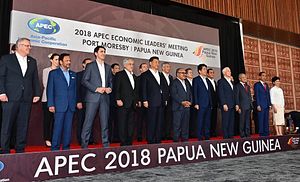The World Bank Country Report on Papua New Guinea (PNG), site of the just-held APEC Summit, calls the Pacific islands nation “one of the most diverse countries in the world.” The bank cites PNG’s 800 languages, 10,000 ethnic clans, and 600 islands, all for a population of only 8 million, as proof of this rich cultural and sociological landscape.
Papua New Guinea, then, is a nation accustomed to handling the special set of challenges that diversity brings. This past weekend, it had the chance to do just that on an international stage as host of the Asia-Pacific Economic Cooperation’s annual summit, bringing together leaders from 21 economies. By all reports, PNG did itself proud.
China didn’t.
Although reports conflict over the seriousness of the incident, it is widely reported that police had to be called when four members of the Chinese delegation barged into the office of the foreign minister of Papua New Guinea, Rimbink Pato. The Times, arguably the newspaper which represents Britain’s most establishment views, did not mince words in its story.
“Police called after Chinese bully host at Pacific summit,” read the story’s headline. It seems the only concession that the paper made to Chinese feelings was to put the article on page 33 of the print edition, rather than on page one.
Protocol dictates that it is inappropriate for member states to engage unilaterally or privately with officials of the host nation during APEC summit meetings. The Chinese are said to have demanded changes to the communique which APEC traditionally issues at the end of each meeting.
In the end, no communique was issued at all, a first in the 30-year history of the APEC summit.
Chinese Foreign Ministry spokesperson Geng Shuang denied the reports of a confrontation in PNG. “Do you believe this story?” he rhetorically asked reporters. “Polite and well-behaved Chinese diplomats barging into the office of the Papua New Guinea’s Foreign Minister?”
Yet to anyone familiar with the behavior of Chinese officialdom, the story does ring true. “Barging in” is a commonly experienced phenomenon in China. Officials often have lower-level minions act as “enforcers” to ensure that the Chinese Community Party line is defended and held, in both word and in deed. When under extreme pressure, however, numerous examples can be found of even senior CCP members interrupting proceedings to insist upon the politically “correct” wording of a document or speech, from a memorandum of understanding to a conference paper.
The situation described in the PNG foreign minister’s office is suspiciously similar to that playbook.
Both Foreign Minister Pato and a spokesperson for the Chinese delegation have played it down — the Chinese more so, unsurprisingly. China goes so far as to say it didn’t happen, despite multiple reports that Chinese delegates were threatened with arrest if they did not leave.
But something serious enough happened to warrant police being posted outside the door of Papua New Guinea’s foreign minister.
The incident is a huge loss of face for China, particularly in a country and in a setting in which it almost certainly expected to dominate the proceedings. Things didn’t go the Chinese way from the beginning, however, with U.S. Vice President Mike Pence, in his address to the assembled delegates, accusing Beijing of “intellectual property theft” to Chinese President Xi Jinping’s face.
On top of that, some in Papua New Guinea are openly calling for caution in allowing China to take a greater economic hold on the country.
PNG is the poorest of the APEC countries. Papua New Guinea remains dependent on aid programs and its close relationship with its former colonial overlord, Australia, for improvements in basic living standards and services.
Nevertheless, Chinese investment in Papua New Guinea has risen dramatically in the last four years, particularly in the now standard Chinese template of roads and other infrastructure projects. As of last year, it is reported that China has spent more than $1.9 billion in Papua New Guinea, and has committed more than $4 billion to building essential roads.
By contrast, the Australian aid budget for fiscal year 2017/18 is $414 million, at the current exchange rate.
Despite China’s largesse, however, PNG opposition politician Gary Juffa warns his fellow countrymen that PNG should resist the temptation to give in to China’s economic coercion. As quoted in the South China Morning Post, Juffa references the example of Malaysia, where Prime Minister Mahathir Mohamad has recently cancelled over $22 billion worth of Belt and Road projects. Mahathir objected to the unjustifiable debt the projects would have caused; Juffa is reported as saying that Mahathir “doesn’t want [Malaysia] to become a colony of China.”
Papua New Guinea, lower by several degrees on the economic development scale, is much more vulnerable to China’s approaches than Malaysia.
“We can have Chinese influence but we need them to be based on our terms, we need to inform them about our laws, the fact that they are in our country and there has to be an element of respect,” Juffa said.
The Chinese would have done well to have heeded that principle in the diplomatic arena of APEC, as well.

































